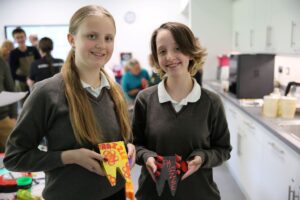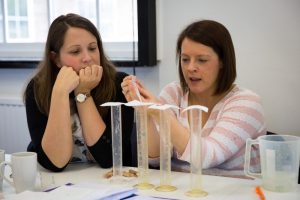Oxford Student Storms FameLab national finals 2019
Friday 14th June 2019

After winning the Oxford heats of FameLab back in March, we were delighted to see Sam Hatfield, an atmospheric physics PhD student at the University of Oxford, be named Runner Up in the competition’s national finals held at the Cheltenham Science Festival in June. Sam ‘stormed’ it with a talk on the hot topic of climate change and the unpredictability of the weather.
Famelab UK aims to find the new voices of science and engineering and Science Oxford hosts the regional heats. People with a gift for creating an engaging story around either their own scientific research or an area of science they find interesting, are given just three minutes to win over a panel of judges and audience. Previous participants have included maths teachers and oil engineers, as well as junior doctors.
We caught up with Sam after his win, and found out ‘weather’ or not he had enjoyed the experience…
What inspired you to apply for FameLab?
I have a vague ambition to one day interact directly with policymakers, whether politicians or civil servants. I thought FameLab would be a good challenge for myself to practice presenting science to those without a science background.
How did you decide on your 3-minute presentation topic – climate change?
I chose to present on climate change because it’s a very topical issue at the moment and I could reasonably expect most people in the audience to already appreciate the importance of the subject, therefore allowing me to cut to the chase. Also, before starting, I didn’t know much about the specific subjects of the talk – carbon budgets and geoengineering – and thought FameLab would be a good chance for me to teach myself about these.
How did you feel when you won the Oxford heats and the runner up prize at the national final?
People always say this, but I was genuinely surprised to win the Oxford heats because of how good the other talks were. Of course I felt very honoured to win the runner up prize at the national final, and was more than happy to be beaten by the winner, Tim Gordon, who gave an incredibly emotive piece on the decline of coral reefs.
Did you pick up any good tips that helped you through to the finals?
I didn’t speak with the judges in Oxford so much, but I did receive plenty of tips from others and from various science communication courses. I have to admit that I did ignore quite a bit of advice when preparing my presentation for the final. I was warned against talking about big numbers, for example. In the end my talk had several references to “gigatonnes”. I think that numbers can be included as long as you match them with a visual aid – in my case Duplo blocks. Another technique, that I picked up from the late physicist David MacKay, is to use units that allow you to talk about big numbers through small numbers. For example, in my talk 150 gigatonnes of carbon dioxide became 1 block of Duplo.
What tips would you pass on to future contestants?
Be yourself. When I first came across FameLab, I saw previous contestants playing musical instruments, impersonating characters and generally being very eccentric and colourful. Many previous contestants treated FameLab almost like stand-up comedy. No doubt there is a role for these kinds of communicators and they have in the past done very well at Famelab. However, there are other ways to communicate science, and if this kind of performance doesn’t come naturally to you then you needn’t feel pressured to replicate it. When I think of my favourite science communicators, I think Carl Sagan and David Attenborough, neither of whom are particularly funny. These kinds of communicators are compelling because of the conviction, authority and clarity with which they talk about science.
What are your plans now? Any more performing on the cards?
From October I will begin as a researcher at the European Centre for Medium-Range Weather Forecasts, in Reading. I probably won’t have any opportunity for science communication directly through my work there, but I am planning to continue it in my free time. I’d like to do Pint of Science, and I’d also like to participate in the Royal Society MP pairing scheme, which allows scientists to interact with elected officials over the course of a week. This kind of interaction is really important for making sure our lawmakers are well informed on societally important issues.
Visit here to find out more about FameLab Oxford, maybe next time it could be you…



